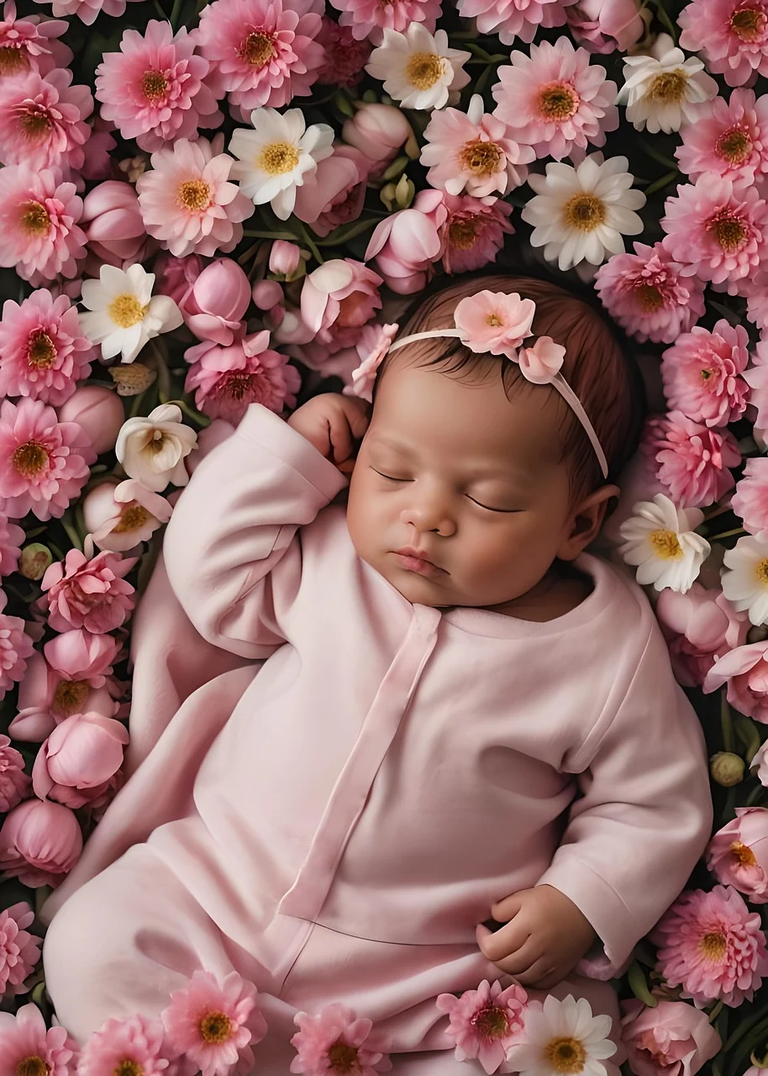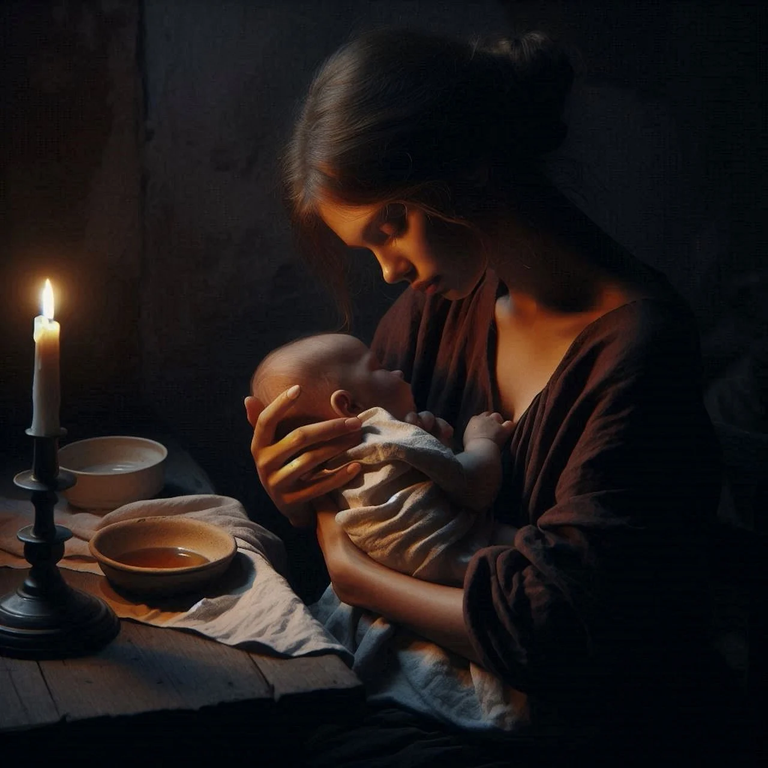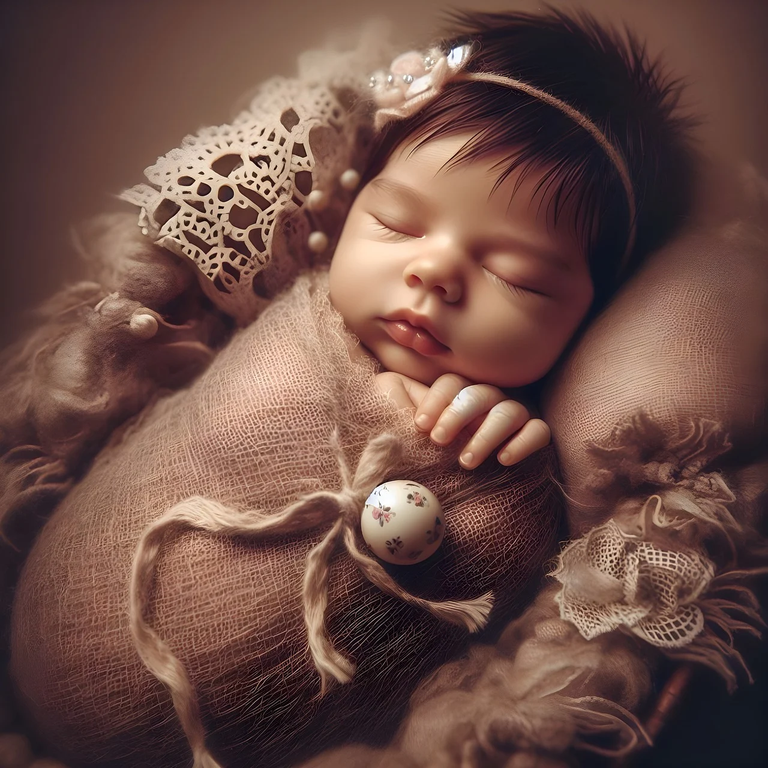Creative nonfiction: How the thorns grow on roses/ De cómo le crecen las espinas a las rosas (ENG/ESP)

How a rose is born

Although she was named after my maternal grandmother, I also believed, in my childish thoughts, that it fit perfectly with the newborn: she was very beautiful, but so delicate, that only mom and dad could touch her:
"You can't touch her and even less with dirty hands",_ mom repeated to us every time we approached the baby's crib. Rosa, or Rosita as we all called her, was a sickly child, who cried a lot, so she spent the whole day in mom's arms and was only in the crib while she slept.

"The teats must be boiled, but also the diapers and clothes, Mrs. Eugenia,” my mother reminded my paternal grandmother, who was the one who helped her.
My parents, haggard and tired, had to take Rosita to the doctor almost every day, because, in spite of the many cares they took of her, her skin rashes were getting worse every day. The doctors could not find the reasons for those persistent eruptions and they made studies, every time they could:
"Today they drew her blood again. They pujected her several times,” my mother told my grandmother, when they returned from the hospital, and although they seemed apparently calm, many times I saw my mother crying while the girl cried insistently:
"But what's wrong with you? Aren't you hungry?" -Mom would ask as she clutched the baby to her breast, but Rosita continued to cry incessantly.
We could only see the baby through the mosquito net, and although Rosita was a baby of months, her skin was getting more and more wrinkled, as if it was shriveling prematurely.

"What's wrong with Rosita, maíta?" -I asked fearfully.
"Nothing. -Nothing,” said my grandmother with that authority typical of Indian women.
"I want to go to where they are,” I said crying, sensing the bad.
"Do you want to be punished? -my grandmother threatened, knowing my answer.
"No,” I answered, sobbing.
"Then stay calm, your parents and Rosita are coming tomorrow".

"Wash your hands and touch her!" -Mom said and put her on her lap.
"What did the doctors say?" -asked my grandmother.
"She is allergic to breast milk. So I should just give her formula milk,” she sighed as Rosita slept peacefully on her lap.
That day I stroked Rosita's skin and although her skin must have been as soft as any baby's, my little sister's was full of little dots that could be felt to the touch, many little dots like a rash, small thorns, a product of allergy and multiple injections. As I caressed her, I thought her name fit her perfectly: there were no roses without thorns.

All images are free of charge and the text is my own, translated in Deepl


Thank you for reading and commenting. Until a future reading, friends
![Click here to read in spanish]
De cómo le crecen espinas a las rosas
Ella nació cuando yo tenía 6 años. Tenía problemas para respirar y con la piel, por lo que, a pesar de que mamá salió del hospital, ella tuvo que quedarse bajo el cuidado de los médicos. Fue después de una semana que la llevaron a casa. Era pequeñita, tenía la piel traslúcida, con pequeñas manchas rojas y le pusieron el nombre de Rosa. Rosa era mi hermana recién nacida.
Si bien aquel nombre se lo pusieron por mi abuela materna, también creí, en mis pensamientos infantiles, que calzaba perfectamente con la recién nacida: era muy hermosa, pero tan delicada, que solo mamá y papá podían tocarla:
_No pueden tocarla y menos con las manos sucias –nos repetía mamá cada vez que nos acercábamos a la cuna de la niña. Rosa, o Rosita como le decíamos todos, era una niña enfermiza, que lloraba mucho, por lo que pasaba todo el día en los brazos de mamá y solo estaba en la cuna mientras dormía.
A petición de los médicos, la cuna debió ser cubierta con una especie de mosquitero para que ningún insecto la picara, ya que cualquier picadura, provocaba rosetones en la delicada piel de la pequeña. Igualmente, todos los objetos y alimentos debían ser esterilizados o hervidos antes de que la bebé tuviera contacto con ellos.
_Los teteros deben pasar por agua hervida, pero también los pañales y la ropita, señora Eugenia –le recordaba mi mamá a mi abuela paterna que era quien la ayudaba.
Mis padres, ojerosos y cansados, debían llevar a Rosita casi diariamente al médico, porque, a pesar de los múltiples cuidados que tenían con ella, las erupciones de la piel empeoraban cada día. Los médicos no encontraban los motivos de aquellas persistentes erupciones y hacían estudios, cada vez que podían:
_Hoy le sacaron nuevamente sangre. La puyaron varias veces –relataba mi madre a mi abuela, cuando regresaban del hospital y aunque aparentemente se veían tranquilos, muchas veces vi a mi madre llorando mientras la niña lloraba insistentemente:
_¿Pero qué tienes? ¿No tienes hambre? –preguntaba mamá mientras se pegaba a la bebé del pecho, pero Rosita seguía llorando sin cesar.
Nosotras solo podíamos ver a la bebé a través del mosquitero y aunque Rosita era una criatura de meses, la piel la tenía cada vez más arrugadita, como si se estuviera marchitando prematuramente.
Un día, la niña comenzó a devolver la leche y a tener problemas para respirar. Recuerdo que mi mamá y mi abuela comenzaron a llorar y salieron corriendo con la bebé en brazos, sin mi papá que estaba en el trabajo. Una vecina se quedó con nosotras y aunque ella no nos dijo nada, sabíamos que algo malo estaba ocurriendo. En la noche, mi abuela regresó a la casa, pero mis padres se tuvieron que quedar en el hospital con la bebé.
_¿Qué tiene Rosita, maíta? –pregunté temerosa.
_ Nada. –dijo mi abuela con esa autoridad propia de la indias.
_Yo quiero ir para donde están ellos –expresé llorando, intuyendo lo malo.
_¿Tú quieres que te puyen? –amenazó mi abuela, conociendo mi respuesta.
_No –respondí sollozando.
_Entonces quédate tranquila, que tus padres y Rosita vienen mañana.
Y aunque no fue al día siguiente sino luego de dos días, mis padres y Rosita regresaron a casa. Esa fue la primera vez que pudimos tocarla:
_¡Lávense las manos y tóquenla! –expresó mamá y la puso en sus piernas._¿Que dijeron los médicos? –preguntó mi abuela.
_Es alérgica a la leche materna. Así que solo debo darle leche de fórmula –suspiró mientras Rosita dormía plácidamente en sus piernas.
Aquel día acaricié la piel de Rosita y aunque su piel debía ser suavecita como la de cualquier bebé, la de mi hermanita estaba llena de puntitos que se sentían al tacto, muchos puntitos como un salpullido, de pequeñas espinas, producto de la alergia y de las múltiples inyecciones. Mientras la acariciaba pensaba que su nombre le calzaba perfectamente: no había rosas sin espinas.
Happy, grateful and honored, friends. Thank you
This story about Rosita is so heartfelt, @nancybriti170. I can imagine the joy when you were finally allowed to touch Rosita. Thank you for sharing this beautiful piece, i enjoyed your story.
Thank God they found out what gave him allergies and he was able to live a normal life. Greetings
Congratulations @nancybriti1! You have completed the following achievement on the Hive blockchain And have been rewarded with New badge(s)
Your next target is to reach 170000 upvotes.
You can view your badges on your board and compare yourself to others in the Ranking
If you no longer want to receive notifications, reply to this comment with the word
STOPCheck out our last posts:
Thank you for the information
You're on a quest for greatness @nancybriti1, and we have no doubt that you'll reach your new target soon!
BTW, we noticed we miss your support for our proposal. Mays we ask you to check it out and consider supporting it?
All you need to do is to click on the "support" button on this page: https://peakd.com/proposals/248.
Thank you!
A delicate rose. Babies are usually very delicate, some more than others. Fortunately, you knew the origin of Rosita's allergies and that improved Rosita's quality of life.
Thanks for sharing your experience with us.
Excellent Saturday.
Yes, thank God. A beautiful Saturday, my friend
Una historia familiar muy bien contada, incorporando aspectos tan reales, con derivaciones afectivas e imaginativas. Saludos, @nancybriti1.
¡Felicitaciones!
Estás participando para optar a la mención especial que se efectuará el domingo 27 de octubre del 2024 a las 8:00 pm (hora de Venezuela), gracias a la cual el autor del artículo seleccionado recibirá la cantidad de 1 HIVE transferida a su cuenta.
¡También has recibido 1 ENTROKEN! El token del PROYECTO ENTROPÍA impulsado por la plataforma Steem-Engine.
1. Invierte en el PROYECTO ENTROPÍA y recibe ganancias semanalmente. Entra aquí para más información.
2. Contáctanos en Discord: https://discord.gg/hkCjFeb
3. Suscríbete a nuestra COMUNIDAD y apoya al trail de @Entropia y así podrás ganar recompensas de curación de forma automática. Entra aquí para más información sobre nuestro trail.
4. Visita nuestro canal de Youtube.
Atentamente
El equipo de curación del PROYECTO ENTROPÍA